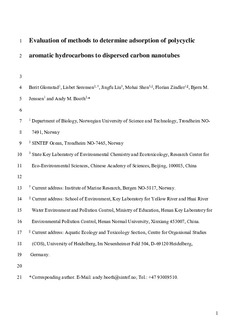| dc.contributor.author | Glomstad, Berit | |
| dc.contributor.author | Sørensen, Lisbet | |
| dc.contributor.author | Liu, Jingfu | |
| dc.contributor.author | Shen, Mohai | |
| dc.contributor.author | Zindler, Florian | |
| dc.contributor.author | Jenssen, Bjørn Munro | |
| dc.contributor.author | Booth, Andy | |
| dc.date.accessioned | 2017-10-10T11:15:54Z | |
| dc.date.available | 2017-10-10T11:15:54Z | |
| dc.date.created | 2017-10-09T11:33:54Z | |
| dc.date.issued | 2017-08-19 | |
| dc.identifier.citation | Environmental science and pollution research international. 2017, 24 23015-23025. | nb_NO |
| dc.identifier.issn | 0944-1344 | |
| dc.identifier.uri | http://hdl.handle.net/11250/2459420 | |
| dc.description.abstract | A number of methods have been reported for determining hydrophobic organic compound adsorption to dispersed carbon nanotubes (CNTs), but their accuracy and reliability remain uncertain. We have evaluated three methods to investigate the adsorption of phenanthrene (a model polycyclic aromatic hydrocarbon, PAH) to CNTs with different physicochemical properties: dialysis tube (DT) protected negligible depletion solid phase microextraction (DT-nd-SPME), ultracentrifugation, and filtration using various types of filters. Dispersed CNTs adhered to the unprotected polydimethylsiloxane (PDMS)-coated fibers used in nd-SPME. Protection of the fibers from CNT adherence was investigated with hydrophilic DT, but high PAH sorption to the DT was observed. The efficiency of ultracentrifugation and filtration to separate CNTs from the water phase depended on CNT physicochemical properties. While non-functionalized CNTs were efficiently separated from the water phase using ultracentrifugation, incomplete separation of carboxyl functionalized CNTs was observed. Filtration efficiency varied with different filter types (composition and pore size), and non-functionalized CNTs were more easily separated from the water phase than functionalized CNTs. Sorption of phenanthrene was high (< 70%) for three of the filters tested, making them unsuitable for the assessment of phenanthrene adsorption to CNTs. Filtration using a hydrophilic polytetrafluoroethylene (PTFE) filter membrane (0.1 μm) was found to be a simple and precise technique for the determination of phenanthrene adsorption to a range of CNTs, efficiently separating all types of CNTs and exhibiting a good and highly reproducible recovery of phenanthrene (82%) over the concentration range tested (70–735 μg/L). | nb_NO |
| dc.language.iso | eng | nb_NO |
| dc.publisher | Springer Berlin Heidelberg | nb_NO |
| dc.rights | Attribution-NonCommercial-NoDerivatives 4.0 Internasjonal | * |
| dc.rights.uri | http://creativecommons.org/licenses/by-nc-nd/4.0/deed.no | * |
| dc.subject | Carbon nanotubes | nb_NO |
| dc.subject | Adsorption | nb_NO |
| dc.subject | Negligible depletion solid phase microextraction | nb_NO |
| dc.subject | Filtration | nb_NO |
| dc.subject | Polycyclic aromatic hydrocarbons | nb_NO |
| dc.subject | Nanomaterials | nb_NO |
| dc.title | Evaluation of methods to determine adsorption of polycyclic aromatic hydrocarbons to dispersed carbon nanotubes | nb_NO |
| dc.type | Journal article | nb_NO |
| dc.type | Peer reviewed | nb_NO |
| dc.description.version | acceptedVersion | nb_NO |
| dc.rights.holder | Copyright © 2017, Springer-Verlag GmbH Germany published version; Copyright © 2018 postprint version; postprint | nb_NO |
| dc.source.pagenumber | 23015-23025 | nb_NO |
| dc.source.volume | 24 | nb_NO |
| dc.source.journal | Environmental science and pollution research international | nb_NO |
| dc.identifier.doi | 10.1007/s11356-017-9953-x | |
| dc.identifier.cristin | 1503306 | |
| cristin.unitcode | 7566,0,0,0 | |
| cristin.unitcode | 7566,6,0,0 | |
| cristin.unitname | SINTEF Ocean | |
| cristin.unitname | Miljøteknologi | |
| cristin.ispublished | true | |
| cristin.fulltext | postprint | |
| cristin.qualitycode | 1 | |

